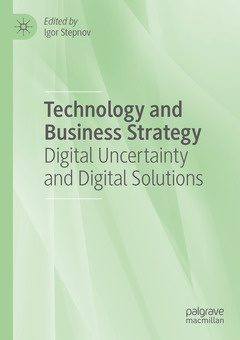Description
Technology and Business Strategy, 1st ed. 2021
Digital Uncertainty and Digital Solutions
Coordinator: Stepnov Igor
Language: English
Subject for Technology and Business Strategy:
Publication date: 02-2022
314 p. · 14.8x21 cm · Paperback
Publication date: 02-2021
314 p. · 14.8x21 cm · Hardback
Description
/li>Contents
/li>Biography
/li>Comment
/li>
This book examines how new technologies have transformed global markets, as well as global business strategy. It explores how digitalization, artificial intelligence, virtual reality, and other changes in technology have led both to new opportunities but also to increased uncertainty within both business and legislature.
By pulling together academics from Russia, China, France, Hungary, Azerbaijan, Tajikistan and other countries, this book provides a truly international perspective on the impact of new technologies across areas including smart cities, corporate governance, EU legislation and logistical enterprise. It will be valuable reading for academics interested in digitization, digital business, digital entrepreneurship and the way that technological change has informed strategy.
Introduction. The Limits of Digital Leadership: from Agile to “Great Leap”.- I. DIGITAL BREAKTHROUGH.- Chapter 1. Future Leadership: the Uncertainty of the Technological Future.- Chapter 2. The Future with Artificial Intelligence: a Strategy for Sucsess.- Chapter 3. The Technological Revolution in the Field of Financial Intermediation.- Chapter 4. Digital Vector of Ensuring Economic Security of the Company.- Chapter 5. Modernization or New Engineering: Models of Leadership in the Global Civil Aviation Market.- Chapter 6. Digital Twins Application in the Management of Scientific and Technological Development of High-Tech Industry.- Chapter 7. Individualization of Approaches in Scenarios of Survival and Development of Companies in the Digital Environment.- Chapter 8. Artificial Intelligence in Public Governance.- Chapter 9. Use of global navigation satellite systems in smart cities.- Chapter 10. Digital Trade Route to Economic Space of the Eurasian Economic Union: Institutions and Technology.- Chapter 11. Digitalization as Objective Factor of the Substitution of the Labor by the Capital.- II. SPURT ECONOMICS’ SYSTEMS.- Chapter 12. Investment to Modernization and Reconstruction of Industrial Equipment: Evaluation of Multiplier Effects for Russia.- Chapter 13. Risks of National Economies Modernization in the Conditions of Technological Leap.- Chapter 14. Imperfect Mechanisms for the Use and Protection of Intellectual Property as an Organizational Barrier in the Movement to Global Technological Leadership.- Chapter 15. Smart cities hyper-economy as the reflection of high-tech-based governance leadership.- Chapter 16. Smart Contracts and Corporate Governance: Prospects and Risks.- Chapter 17. Urban Mobility: from Traditional to Intelligent Forms of Mobility.- Chapter 18. Banking in paradigm of the sustainable development goals.- Chapter 19. The Role of the Directors’ and Officers’ Insurance Contract in Corporate Governance.- Chapter 20. On the Constitutional Court’s Position about Freedom and Privacy in the Banking Sector.- Conclusion. Technology Leadership Performance: Opportunities and Threats.




